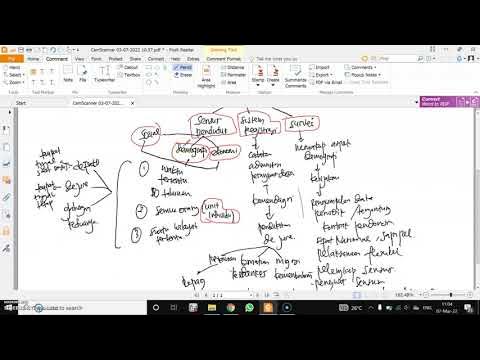Modern health information systems in Malawi
Summary
TLDRBongani Jolanda, responsible for Malawi's district health information system, discusses the impact of transitioning from paper-based data collection to an online-based system. This shift enables real-time data access, significantly improving decision-making and resource planning, especially in areas like malaria management. Previously, it took up to a year for data to be available, but now, data flows seamlessly, helping health managers make informed decisions. Despite challenges like patient overload and insufficient staffing, the new system has brought positive changes to healthcare operations in Malawi.
Takeaways
- 😀 Informed decision-making is key to making effective choices in healthcare management.
- 😀 Data from Electronic Health Records (EHRs) plays a crucial role in planning healthcare needs, such as drug supplies for diseases like malaria.
- 😀 Accurate data can help estimate required supplies based on previous cases, improving resource planning for seasonal diseases.
- 😀 Malaria outbreaks in specific regions, like the Nano district, require careful planning due to the large number of cases and resource limitations.
- 😀 Patient overload in healthcare facilities is a major challenge, as there are not enough nurses to manage the increasing number of patients.
- 😀 Bongani Jolanda is in charge of the District Health Information System (DHIS) in Malawi, overseeing its implementation and training users.
- 😀 The DHIS system is used for data collection and aggregation, replacing paper-based methods with an online system for better accessibility.
- 😀 The Ministry of Health in Malawi transitioned from paper-based data collection to an online system, significantly improving data flow and accessibility.
- 😀 The new system allows real-time data access, which was previously unavailable for up to a year, helping healthcare managers make timely decisions.
- 😀 The introduction of the electronic health management system has improved the timeliness and accuracy of data, addressing critical decision-making needs for healthcare managers.
Q & A
What is the significance of data in decision-making, as mentioned in the transcript?
-Data is crucial for making informed decisions, as it provides valuable insights for planning and resource allocation, such as predicting how many supplies are needed for health issues like malaria.
How does having access to better data improve health planning, specifically in the context of malaria?
-Better data allows for more accurate projections of malaria cases, helping health workers plan the necessary supplies and ensure they are available during peak seasons, ultimately improving health service delivery.
What is a major challenge in healthcare mentioned in the transcript?
-A major challenge is patient overload, where the number of patients often exceeds the available healthcare resources, including both staff and equipment.
Who is Bongani Jolanda, and what is his role in the district health information system?
-Bongani Jolanda is in charge of the district health information system in Malawi. His responsibilities include implementing and training users on the system, as well as promoting its usage across the country.
How did the Ministry of Health in Malawi transition from paper-based systems to digital solutions?
-The Ministry of Health migrated from paper-based data collection to an online-based district health system (DHS), which significantly improved data access and management.
What benefits does the online-based district health system provide?
-The online-based system allows health data to be accessed anytime and from anywhere, making it easier for healthcare managers to monitor and respond to health needs efficiently.
What was the major issue with the previous system of data collection?
-Before the new system, data from healthcare facilities could take up to a year to be processed and entered into the system, causing delays in decision-making and resource allocation.
What change occurred after the introduction of the electronic health management information system (EHR)?
-After the introduction of the EHR, data flow became faster, allowing for real-time access to critical health information, which greatly improved decision-making and responsiveness.
How does the new system help healthcare managers in Malawi?
-The new system enables healthcare managers to access timely data, which is essential for making informed decisions on health service provision, such as resource allocation and patient care.
Why is timely data flow critical in healthcare decision-making?
-Timely data flow is critical because it ensures that managers have up-to-date information to respond to health challenges promptly, minimizing delays in action and improving overall service delivery.
Outlines

This section is available to paid users only. Please upgrade to access this part.
Upgrade NowMindmap

This section is available to paid users only. Please upgrade to access this part.
Upgrade NowKeywords

This section is available to paid users only. Please upgrade to access this part.
Upgrade NowHighlights

This section is available to paid users only. Please upgrade to access this part.
Upgrade NowTranscripts

This section is available to paid users only. Please upgrade to access this part.
Upgrade NowBrowse More Related Video

Integrasi Pelayanan Kesehatan Primer

What If China sets NEET Paper? - Mohit Sharma Sir | NEXT IAS Beyond Classroom

SUMBER DATA KEPENDUDUKAN - MATERI KULIAH DASAR KEPENDUDUKAN

Makalah Penelitian Sistem Informasi Penyewaan Mobil Berbasis Website Pada MY RENTAL MOBIL

Sistema de Informação sobre Mortalidade: você conhece?

Development of a cloud-based IoT system for livestock health monitoringusing AWS and python - K2
5.0 / 5 (0 votes)